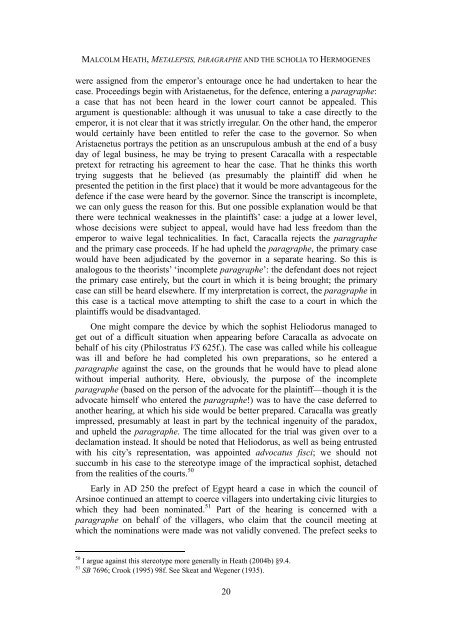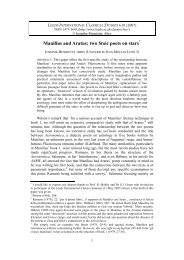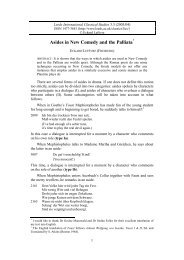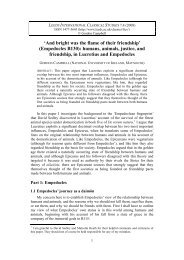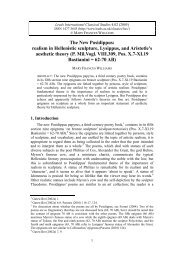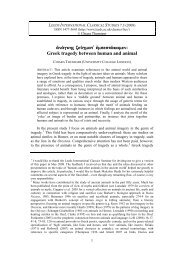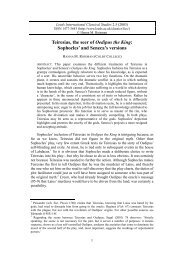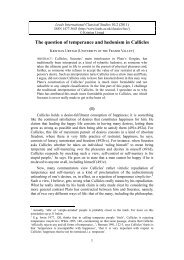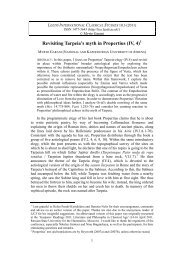Metalepsis, paragraphe and the scholia to Hermogenes - Leeds ...
Metalepsis, paragraphe and the scholia to Hermogenes - Leeds ...
Metalepsis, paragraphe and the scholia to Hermogenes - Leeds ...
Create successful ePaper yourself
Turn your PDF publications into a flip-book with our unique Google optimized e-Paper software.
MALCOLM HEATH, METALEPSIS, PARAGRAPHE AND THE SCHOLIA TO HERMOGENES<br />
were assigned from <strong>the</strong> emperor’s en<strong>to</strong>urage once he had undertaken <strong>to</strong> hear <strong>the</strong><br />
case. Proceedings begin with Aristaenetus, for <strong>the</strong> defence, entering a <strong>paragraphe</strong>:<br />
a case that has not been heard in <strong>the</strong> lower court cannot be appealed. This<br />
argument is questionable: although it was unusual <strong>to</strong> take a case directly <strong>to</strong> <strong>the</strong><br />
emperor, it is not clear that it was strictly irregular. On <strong>the</strong> o<strong>the</strong>r h<strong>and</strong>, <strong>the</strong> emperor<br />
would certainly have been entitled <strong>to</strong> refer <strong>the</strong> case <strong>to</strong> <strong>the</strong> governor. So when<br />
Aristaenetus portrays <strong>the</strong> petition as an unscrupulous ambush at <strong>the</strong> end of a busy<br />
day of legal business, he may be trying <strong>to</strong> present Caracalla with a respectable<br />
pretext for retracting his agreement <strong>to</strong> hear <strong>the</strong> case. That he thinks this worth<br />
trying suggests that he believed (as presumably <strong>the</strong> plaintiff did when he<br />
presented <strong>the</strong> petition in <strong>the</strong> first place) that it would be more advantageous for <strong>the</strong><br />
defence if <strong>the</strong> case were heard by <strong>the</strong> governor. Since <strong>the</strong> transcript is incomplete,<br />
we can only guess <strong>the</strong> reason for this. But one possible explanation would be that<br />
<strong>the</strong>re were technical weaknesses in <strong>the</strong> plaintiffs’ case: a judge at a lower level,<br />
whose decisions were subject <strong>to</strong> appeal, would have had less freedom than <strong>the</strong><br />
emperor <strong>to</strong> waive legal technicalities. In fact, Caracalla rejects <strong>the</strong> <strong>paragraphe</strong><br />
<strong>and</strong> <strong>the</strong> primary case proceeds. If he had upheld <strong>the</strong> <strong>paragraphe</strong>, <strong>the</strong> primary case<br />
would have been adjudicated by <strong>the</strong> governor in a separate hearing. So this is<br />
analogous <strong>to</strong> <strong>the</strong> <strong>the</strong>orists’ ‘incomplete <strong>paragraphe</strong>’: <strong>the</strong> defendant does not reject<br />
<strong>the</strong> primary case entirely, but <strong>the</strong> court in which it is being brought; <strong>the</strong> primary<br />
case can still be heard elsewhere. If my interpretation is correct, <strong>the</strong> <strong>paragraphe</strong> in<br />
this case is a tactical move attempting <strong>to</strong> shift <strong>the</strong> case <strong>to</strong> a court in which <strong>the</strong><br />
plaintiffs would be disadvantaged.<br />
One might compare <strong>the</strong> device by which <strong>the</strong> sophist Heliodorus managed <strong>to</strong><br />
get out of a difficult situation when appearing before Caracalla as advocate on<br />
behalf of his city (Philostratus VS 625f.). The case was called while his colleague<br />
was ill <strong>and</strong> before he had completed his own preparations, so he entered a<br />
<strong>paragraphe</strong> against <strong>the</strong> case, on <strong>the</strong> grounds that he would have <strong>to</strong> plead alone<br />
without imperial authority. Here, obviously, <strong>the</strong> purpose of <strong>the</strong> incomplete<br />
<strong>paragraphe</strong> (based on <strong>the</strong> person of <strong>the</strong> advocate for <strong>the</strong> plaintiff—though it is <strong>the</strong><br />
advocate himself who entered <strong>the</strong> <strong>paragraphe</strong>!) was <strong>to</strong> have <strong>the</strong> case deferred <strong>to</strong><br />
ano<strong>the</strong>r hearing, at which his side would be better prepared. Caracalla was greatly<br />
impressed, presumably at least in part by <strong>the</strong> technical ingenuity of <strong>the</strong> paradox,<br />
<strong>and</strong> upheld <strong>the</strong> <strong>paragraphe</strong>. The time allocated for <strong>the</strong> trial was given over <strong>to</strong> a<br />
declamation instead. It should be noted that Heliodorus, as well as being entrusted<br />
with his city’s representation, was appointed advocatus fisci; we should not<br />
succumb in his case <strong>to</strong> <strong>the</strong> stereotype image of <strong>the</strong> impractical sophist, detached<br />
from <strong>the</strong> realities of <strong>the</strong> courts. 50<br />
Early in AD 250 <strong>the</strong> prefect of Egypt heard a case in which <strong>the</strong> council of<br />
Arsinoe continued an attempt <strong>to</strong> coerce villagers in<strong>to</strong> undertaking civic liturgies <strong>to</strong><br />
which <strong>the</strong>y had been nominated. 51 Part of <strong>the</strong> hearing is concerned with a<br />
<strong>paragraphe</strong> on behalf of <strong>the</strong> villagers, who claim that <strong>the</strong> council meeting at<br />
which <strong>the</strong> nominations were made was not validly convened. The prefect seeks <strong>to</strong><br />
50 I argue against this stereotype more generally in Heath (2004b) §9.4.<br />
51 SB 7696; Crook (1995) 98f. See Skeat <strong>and</strong> Wegener (1935).<br />
20


